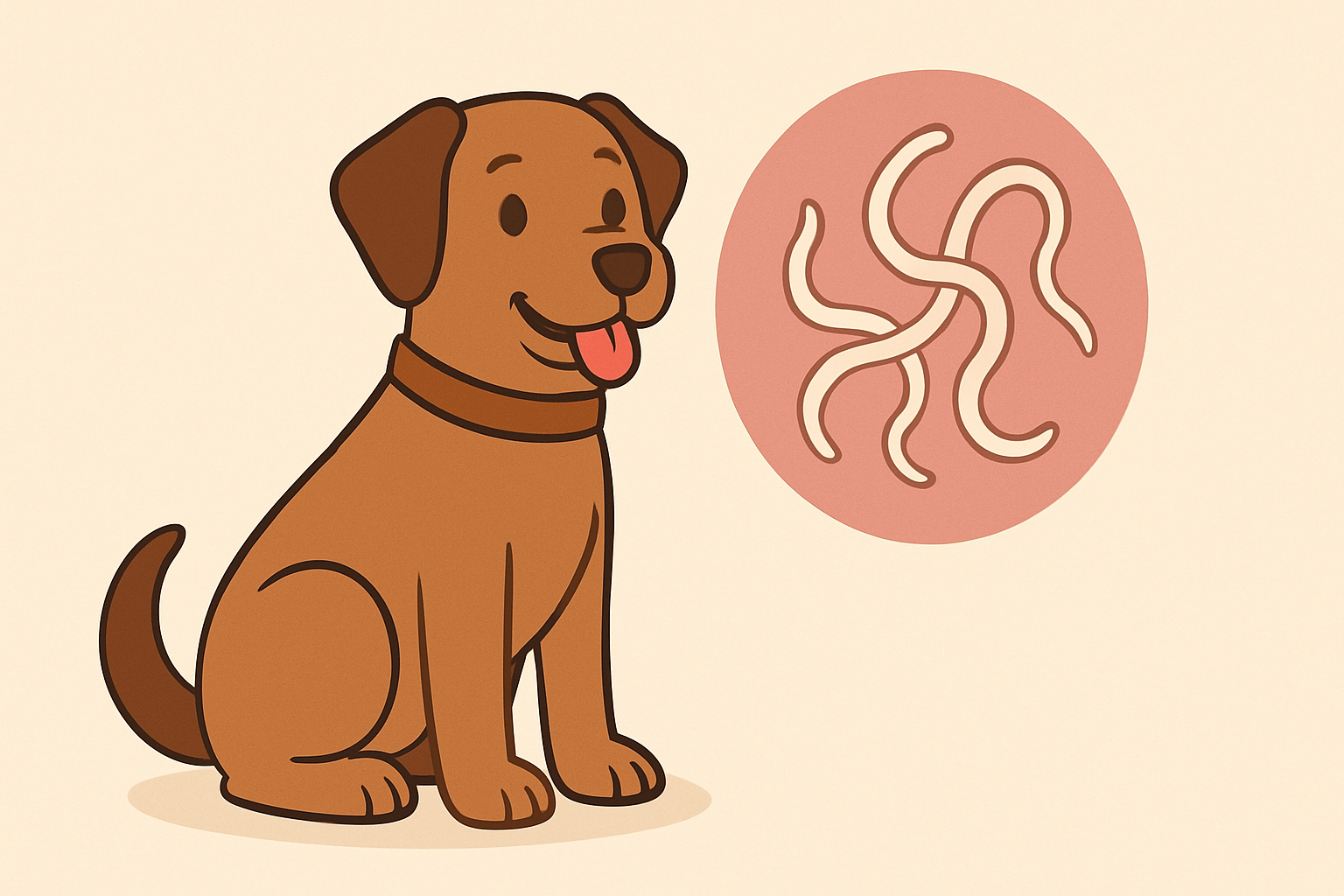Worms are tiny, but they can lead to huge issues for our furry friends. Deworming your dog is not merely a part of common pet maintenance—it's vital for long-term health and well-being. In this article, we'll dissect everything you should know regarding deworming for dogs: the various kinds of worms, how testing is done, best schedules, a quick checklist, and how to avoid future infections.
Types of Worms in Dogs
Dogs can host a variety of intestinal parasites, some of which can even be transmitted to humans. Here are the most common types:
Roundworms
The most common intestinal worm in dogs.
Puppies can get them from their mother or through contaminated environments.
Symptoms: pot-bellied appearance, vomiting, diarrhea, and stunted growth.
Hookworms
Tiny, blood-sucking parasites that can cause anemia.
Spread through contaminated soil or from mother to puppy during nursing.
Symptoms: pale gums, weakness, diarrhea, and weight loss.
Tapeworms
Acquired through ingesting fleas or raw meat.
Easily spotted as rice-like segments in the dog’s stool or around the anus.
Symptoms: often mild but may include itching, scooting, and digestive upset.
Whipworms
Reside in the large intestine and can cause severe irritation.
Spread through contact with contaminated feces or soil.
Symptoms: chronic diarrhea, weight loss, and lethargy.
Heartworms
Transmitted by mosquito bites, they live in the heart and lungs.
Not treated by regular dewormers; requires a different preventive approach.
Symptoms: coughing, fatigue, and eventually heart failure if untreated.
Testing for Worms in Dogs
Veterinarians typically use fecal exams to detect intestinal worms. A fresh stool sample is examined under a microscope to identify parasite eggs. For heartworms, a blood test is required.
When to Test:
- Puppies: Every 2–3 weeks starting at 2–3 weeks of age.
- Adults: At least once a year during their annual check-up.
- Before starting a deworming schedule or switching medications.
Deworming Schedule for Dogs
Puppies:
- Start deworming at 2 weeks of age.
- Repeat every 2 weeks until they are 12 weeks old.
- Monthly treatments until they are 6 months old.
Adult Dogs:
- Deworm every 3 to 6 months based on lifestyle (e.g., outdoor dogs may need more frequent treatment).
- Year-round heartworm prevention with monthly medication.
Pregnant & Nursing Dogs:
- Consult your vet—deworming may be needed before breeding, during pregnancy, and after whelping to protect the puppies.
Deworming Checklist
- ✅ Schedule a fecal test annually (or more if needed)
- ✅ Use vet-recommended dewormers appropriate for your dog's age and weight
- ✅ Monitor for symptoms like scooting, vomiting, diarrhea, and bloated abdomen
- ✅ Clean up your dog’s waste immediately to reduce environmental contamination
- ✅ Treat all pets in the household to prevent cross-infection
- ✅ Use flea control to reduce tapeworm risk
- ✅ Keep your dog’s living space clean and sanitized
Preventing Worm Infections in Dogs
Prevention is easier—and safer—than treatment. Here’s how to reduce your dog’s risk of worm infestations:
- Practice Good Hygiene: Clean up feces promptly and wash your hands after handling pets.
- Use Preventive Medications: Monthly parasite preventives often cover multiple types of worms, including heartworms and intestinal worms.
- Control Fleas: Tapeworms often come from ingesting infected fleas.
- Avoid Raw Meat: Feeding uncooked or undercooked meat can expose your dog to various parasites.
- Keep Play Areas Clean: Avoid letting your dog eat or sniff around in areas with unknown animal waste.
- Regular Vet Visits: Stay on schedule with wellness exams and parasite screenings.
Final Thoughts
Deworming is a simple yet powerful way to keep your dog healthy, active, and happy. With regular vet care, awareness of symptoms, and good preventive practices, you can help your dog live a parasite-free life. Always consult your veterinarian to create a personalized deworming and prevention plan tailored to your dog's age, environment, and lifestyle.
Frequently Asked Questions (FAQs)
1. What are the most common types of worms in dogs?
2. How do I know if my dog has worms?
3. How often should I deworm my dog?
4. Can indoor dogs get worms?
5. How are worms diagnosed in dogs?
6. Are worms in dogs contagious to humans?
7. How can I prevent my dog from getting worms?
8. Is natural deworming effective for dogs?
9. Do puppies need special deworming care?
10. What should I do if I see worms in my dog's stool?

About SniffnTail
SniffnTail is your go-to destination for everything pets. From helpful advice, tips, and insights to thoughtfully selected products and resources, we’re here to support pet owners at every stage of their journey. Whether you're caring for a playful pup, a wise old cat, or anything in between, SniffnTail offers tools and knowledge to make pet parenting easier and more joyful.
Related Articles
 Health & Wellness • 6 minutes
Health & Wellness • 6 minutesThe Link Between Bad Dog Breath and Dental Disease
Discover how bad dog breath is more than a nuisance—it's a sign of potential dog dental disease. Learn symptoms, causes, and what pet parents can do to protect their dog's oral health.
 Health & Wellness • 7 min read
Health & Wellness • 7 min readGolden Retriever Abandonment Issues: When Loyalty Becomes Anxiety
Explore how extreme attachment behaviors and waiting behaviors in Golden Retrievers can lead to anxiety, and learn how to help your loyal pup cope.
 Health & Wellness • 5 min read
Health & Wellness • 5 min read3-Minute Daily Dental Care Routine for Busy Pet Parents
Discover a quick dog teeth cleaning routine designed for busy pet owners. Learn easy dog dental care tips to keep your furry friend's smile healthy with just 3 minutes daily.

